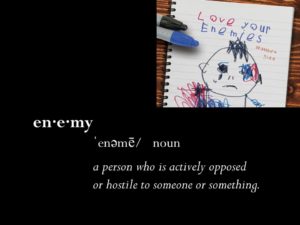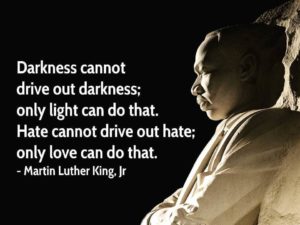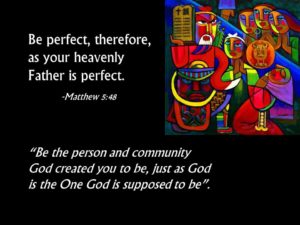Turn the other cheek – love our enemies – pray for those who persecute us? Of course, it all looks good on paper, especially coming from Jesus, but come on, he can’t be serious? And just when you thought you might be able to try out this stuff from Jesus – he caps it off with an unrealistic command to be perfect like God. Impossible? Improbable? Not with Jesus.
Who is your enemy?
en·e·my ˈenəmē/ noun
a person who is actively opposed or hostile to someone or something.
I have mentioned before that I am a fan of the show, “The Big Bang Theory”. One of the lead characters is the physicist, Dr. Sheldon Cooper, a quirky, savant type. The topic of “sworn enemies” came up in one episode and it turns out that Sheldon has a running list of 61 enemies that move up and down the list depending upon their actions, or at least their perceived actions, against him. They range from other scientists in his field to the kid that bullied him when he was a child.
Of course, it is over the top and all of that, but it gets me thinking this week about enemies – do we have personal, “sworn enemies”? Who are they? What do we do about them?
We actually hear a lot about enemies these days – from Russia, to ISIS and terrorism in general, to North Korea; to much closer to home – those who perpetrate the seemingly unstoppable gun violence in Chicago with the loss of still more young, innocent life.
Against this backdrop we have Jesus’ words – again coming to us from the Sermon on the Mount. We are still in the midst of some of the “Hard Sayings” of Jesus. Last week I spoke about Jesus’ use of hyperbole as a teaching device – this week, not so much. I think Jesus is dead serious in this passage – no hyperbole here.
Turn the other cheek – love our enemies – pray for those who persecute us? Of course, it all looks good on paper, especially coming from Jesus, but come on.
But, we have a problem – Jesus isn’t kidding. Jesus is outlining a vision of God’s kingdom and is inviting our buy in, our willingness to give it a go, to not only be the change, but to be changed.
This vision goes against the grain – goes against the culture of Jesus’ day, of our day – Jesus calling the powers into question by describing an entirely different way to relate to each other. Jesus inviting us into relationships governed not by power but by vulnerability grounded in love.
Without question, for some, this feels weak and ineffectual. And yet, where do the cycles of revenge and retribution end? Gandhi echoes Jesus words, almost two thousand years later when he said, “’An eye for an eye’ makes all people blind.”
The Christian Century is a magazine that has been inviting essays from its readers based on a one-word prompt. This past week they published a series of essays based on the word: enemy.
The following is from a reader from Plantation, Florida named Craig Anderson. He writes:
In 1983 I was an observer at the Assembly of the World Council of Churches in Vancouver, British Columbia. One afternoon a resolution was brought to the floor calling for an end to the practice of apartheid in South Africa. Before a vote could be taken, a diminutive man wearing a magenta clerical shirt stepped quickly up to a floor microphone. Following protocol, he introduced himself. “My name is Desmond Tutu,” he said. He lauded the motion and thanked the resolutions committee for its work.
Then in a soft-spoken voice he said (here I paraphrase): “I have only one concern about the declaration. I note the absence of any expression of love for our white South African brothers and sisters, even those who support the existing unjust policy that’s so destructive to my people and our nation. We, of course, want change; indeed, we must have change. But we want our oppressors to know that though we oppose their policies, we wish them no ill.
Fairness and just treatment for all people in South Africa is all that we want, and when this policy is eventually overturned, we want to work side by side with all South Africans toward peace and reconciliation in our nation.”
It was an electric moment. A hush fell over the assembly, and we sensed the presence and power of the Holy Spirit in our midst. Bishop Tutu moved that the resolution be sent back to committee for the inclusion of these sentiments. The motion received unanimous approval. (Craig E. Anderson, Plantation, Florida)
It is still remarkable the change that happened in South Africa – the hard work that was done and continues in bringing peace and reconciliation to the people of that country. Love alone transforms, redeems, and creates new life. A student of both Jesus and Gandhi , Martin Luther King, Jr., once said, “Darkness cannot drive out darkness: only light can do that. Hate cannot drive out hate: only love can do that.”
This whole thing still feels other worldly to me – Jesus and Gandhi and Martin Luther King and Desmond Tutu are icons and way out of my league – what Jesus is calling us to do is more than challenging, but what puts it over the top are Jesus final words in this passage:
Be perfect, therefore, as your heavenly Father is perfect. (Matthew 5:48)
Just when you thought you might be able to try out this stuff from Jesus a little bit – he caps it off with an unrealistic command to be perfect like God.
But hang on, before we write this whole thing off, we need to look a little deeper at the word “perfect”. The Greek word that is translated as perfect, is the word – Telos.
Telos typically isn’t about something being flawless, rather it refers to something that has grown up, matured, and has now reached its perfect end. That is to say that telos is something’s goal or desired outcome. For example, an apple tree’s telos is to grow mature and healthy so that it can bear fruit.
This means that we might translate this passage more loosely to mean, “Be the person and community God created you to be, just as God is the One God is supposed to be.”
As we conclude our time in the Sermon on the Mount and this 5th chapter, we might recognize that in Jesus’ words we have heard not only command and directives, but also promise. Promise – that God sees more in us than we do. Promise – that God has plan and purpose for God’s creation and for us. Promise – that God’s desire is that we be precisely who God created us to be and, in so doing, we join with God to create a different kind of world.
Jesus calls this new world the kingdom of God – a way of being where violence doesn’t always breed more violence and hate doesn’t always kindle more hate.
Can we be “perfect” in all of this, like we think of perfect? Probably not and on some days, maybe not even at all.
But, we can take seriously, that we are invited, by God every day, to be more than we think we can be – to be the people and the community that God has created us to be. This may well lead us against the grain in our world – but it may also work to change our world for the better.
Martin Luther once said that the Christian life is not about arriving but always about becoming.
May our lives be a reflection of those words. Amen.
Rev. John Berg
Gloria Dei Lutheran Church
Northbrook, IL
Resources:
Christian Century – Enemy: Essays by readers, February 16, 2017.
Craig E. Anderson, Plantation, Florida
Christian Century Essays
David Lose – “The Revolution Starts Here,” February 18, 2014.










